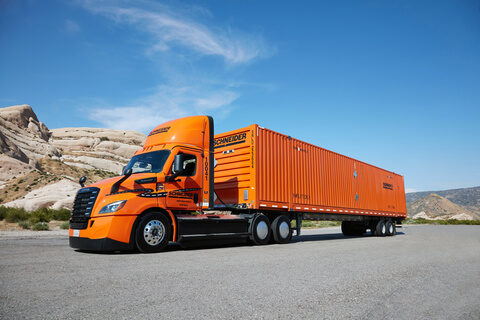Schneider National Inc., a multimodal provider of transportation, intermodal and logistics services, says the carrier’s battery electric vehicle (BEV) fleet has hit the milestone of hauling more than 1 million zero-emission miles of customer freight.
Schneider currently operates one of the largest BEV fleets in North America at the company’s Southern California Intermodal Operations Center, featuring almost 100 Freightliner eCascadias and a charging depot about half the size of a football field.
The carrier’s first electric trucks began hauling freight in January. Since then, the fleet has grown to a total of 94 electric vehicles, including 92 battery electric trucks and two electric yard spotters.
“We are driven by our commitment to sustainability and innovation to be one of the first carriers to embrace electric as a powerful solution for hauling freight,” says Mark Rourke, Schneider president and CEO. “We believe in a future where clean technology helps transform the way we move goods and reduces our environmental footprint while still delivering on our promises of efficiency and reliability for customers. This milestone is just the first of many.”
Schneider worked alongside Freightliner’s parent company, Daimler Truck North America (DTNA), as the eCascadia evolved, piloting a truck for six months in 2020-2021 through the Freightliner Customer Experience Fleet.
The South El Monte, Calif., charging site features 16 350 kW dual-corded dispensers, allowing the carrier to charge 32 trucks simultaneously. The eCascadias achieve an 80% charge within 90 minutes and have a typical driving range of up to approximately 220 miles.
Funding for 50 of Schneider’s 92 eCascadias was made possible by the Joint Electric Truck Scaling Initiative (JETSI), the first battery electric truck project jointly funded by the California Air Resources Board and the California Energy Commission.
For the additional 42 trucks outside JETSI, five are jointly funded by the U.S. EPA FY18 Targeted Airshed Grant and Hybrid and Zero-Emission Truck and Bus Voucher Incentive Program (HVIP), seven are funded by the Volkswagen Environmental Mitigation Trust, and 30 trucks are funded by HVIP.




